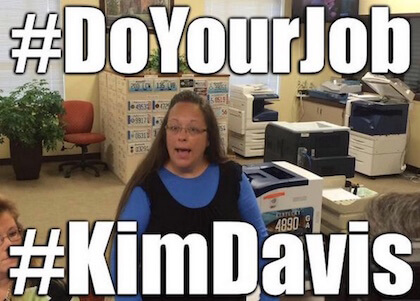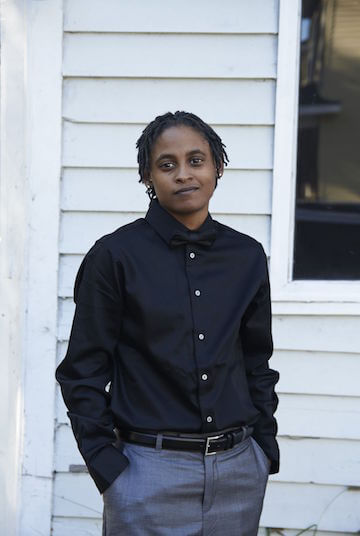More than a week after a federal judge released her from jail over her refusal to issue marriage licenses, Rowan County Clerk Kim Davis continues to resist an order that she do her job.
While Davis spent almost five days in jail for contempt of court on orders from US District Judge David L. Bunning, all of her deputies, except her son Nathan, began issuing marriage licenses –– to same-sex and different-sex couples –– ending a Rowan County license drought that began after the Supreme Court’s marriage ruling in June. After her release, Davis took the rest of the week off, while speculation swirled about whether she was prepared to comply with Bunning’s order. One of her deputies, Brian Mason, said he was prepared to defy his boss if she tried to bar him from issuing additional licenses.
When Davis returned to work on September 14, she announced she would not interfere with her deputies issuing licenses, but said her name would not appear on the forms and that she could not vouch for their legality. Licenses issued since then, signed by Mason, have identified him not as a deputy clerk but rather as a notary public, and included the notice that they were issued “pursuant to a court order.” Democratic Governor Steve Beshear noted that Bunning made no objection to the licenses and said he was comfortable with their legality.
Kentucky county clerk’s defiance grows ever more arcane
In spite of Beshear’s statement, the American Civil Liberties Union, which had taken Davis to Bunning’s courtroom over her refusal to issue licenses, expressed “concern” about whether the modified licenses were sufficient. As Gay City News went to press on September 16, the ACLU had not yet decided whether to take additional steps to resolve the uncertainty.
ACLU remains in court with Davis over several other issues. Davis failed before Bunning, the Sixth Circuit Court of Appeals, and the Supreme Court to win a stay on Bunning’s order that she issue marriage licenses. She is now pursuing the same route regarding Bunning’s September 3 order that his mandate that she issue licenses applied not only to the ACLU’s plaintiff couples, but to all couples who seek a marriage license.
The ACLU expects a decision soon from the Sixth Circuit on whether Bunning’s order that extended his ruling to all couples seeking licenses is valid. It’s hard to see how Davis could prevail.
James Esseks, director of the ACLU’s Lesbian, Gay, Bisexual and Transgender Project, said, “Ms. Davis keeps asking the same question and getting the same answer from the courts –– that she has to do her job. Issuing marriage licenses doesn’t mean she approves of those marriages, it just means she’s doing the job she was elected to do.”
In separate litigation, Davis has sued Beshear seeking relief from the state regarding her responsibility to issue licenses. On September 15, the US Sixth Circuit Court of Appeals declined to grant the governor summary judgment –– dismissing Davis’ case –– but noted she “has not demonstrated a substantial likelihood of success on her federal constitutional claims.” Despite the Sixth Circuit’s clear skepticism about the merits of Davis’ claims, then, she will be able to pursue her case.
Davis’ continued legal maneuvering has cast doubt on the question of same-sex couples marrying in Rowan County, yet licenses continue to be issued. The more important question may be what the federal courts can do about her resistance. Bunning’s jail sentence was not intended as punishment, but rather as a means to force her compliance. Arguably, she is still not in compliance. The judge’s options at this point are uncertain, something that likely explains why the ACLU, while voicing concern, has not announced a clear next step.
How the Davis case ends is significant, given reports that some local officials in North Carolina, where issuing licenses is mandated, and in Alabama, where clerks are empowered but not required to issue licenses, are following Davis’ lead.




































